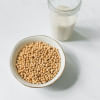How to get back into exercise mode in 2018
Many of us start the year with plans to take up exercise again, but find it hard to keep the momentum going month after month. Have no fear, we've got the lowdown on how to get moving, have fun, and avoid injury.
The golden rule for anyone who wants to bring exercise back into their life is to gradually increase the level of intensity and make sure you practice regularly, while keeping in mind your age and physical condition.
It's better to opt for moderate physical activity three to four times a week, alternating muscle-strengthening and cardio exercises (cycling, walking, running, etc.), rather than give it everything you've got just at the weekend.
Even if you're in good health, check that you're not lacking in any vitamins or minerals, as they are essential for exercising safely.
For instance you may need to up your vitamin D, as most people living in countries with few sunny days have low levels of this micronutrient. Vitamin D helps to prevent bone fractures and is found in oily fish, eggs and cod liver oil; you can also take supplements.
It's equally important to have optimum vitamin C levels for regular endurance training, especially in winter. Vitamin C is found in berries (blackberries, bilberries and raspberries), citrus fruit (oranges and limes), kiwis and pomegranates. You can also take a natural supplement such as acerola (a small, red South American fruit) or opt for the synthetic form of the vitamin (no more than one gram per day).
Magnesium is key to alleviating tiredness and cramps: if you have low levels of this mineral, which is often the case for people who exercise regularly, your sporting performance falls off and recovery is slower. The daily recommended dose is 350mg for women and 420mg for men.
Sparkling mineral water that is rich in magnesium and bicarbonates can counterbalance the acidity in the body produced by physical activity. Trace elements such as iron, zinc, and manganese are also vital for practicing sport safely.
In terms of fuel, our bodies need protein (one gram per kg of body weight a day) to prevent muscle weakening. If you are training for a marathon or lift weights regularly, 1.7g/kg/day is recommended.
Lastly, one of the keys to sticking to fitness resolutions and remaining motivated throughout the year is to choose an activity you really like and is close to home or work.
Anyone over 50 should try to sleep at least seven hours a night, and schedule a cardiac check-up regularly.
If you are overweight or suffer from chronic pain, a specialist can provide advice on sports that would be suitable for you.

 For all latest news, follow The Daily Star's Google News channel.
For all latest news, follow The Daily Star's Google News channel. 








Comments